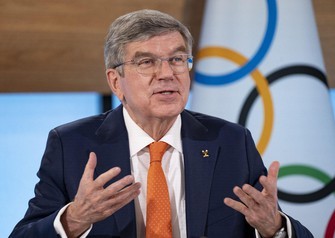Vaccination not required for Tokyo Games athletes, Bach says

GENEVA (March 13, Kyodo) -- International Olympic Committee President Thomas Bach reiterated Friday that vaccination for the coronavirus will not be a requirement for athletes competing at the Tokyo Games following concerns about the slow pace of the vaccine rollout in Japan.
With the Olympic host nation having faced delays securing vaccine doses, there is a possibility some Japanese athletes may not be vaccinated in time for the July 23 start of the games.
But Bach, speaking at a press conference following an IOC session, said the body had "made it clear from the very beginning" that it would not impose an obligation for vaccination, and would follow government guidelines on the matter.
"The athletes and the national Olympic committees should follow their national regulations on vaccination. This is a clear government responsibility and in this, we will not interfere," Bach said.
"We will work with the NOCs to get as many as possible of the participants being vaccinated, but always within the relevant national guidelines."
Japan is set to receive about 100 million doses of COVID-19 vaccine from Pfizer Inc. in May and June, enough for nearly half of its population, according to the Japanese government.
Bach revealed Thursday that the Chinese Olympic Committee had offered to provide vaccine doses for athletes at the Tokyo Games, which have been postponed by a year because of the coronavirus pandemic, as well as next year's Beijing Winter Olympics.
The IOC and four other organizing bodies have agreed to make a decision on fan attendance at the games by the end this month, but the Japanese government has already decided to exclude overseas spectators, according to officials with knowledge of the matter.
Asked about human rights concerns in China raised by activists and some other countries ahead of the 2022 games, Bach said the IOC was "taking this very seriously," but was limited in its ability to respond.
"We are not a super world government that can solve or address issues" for which the United Nations Security Council and other international bodies have no solution, Bach said.
At its online session, the IOC also unanimously approved a package of 15 recommendations that will guide decision-making in Bach's last four years at the head of the organization.
Among the recommendations, the IOC will seek to "encourage the development of virtual sports and further engage with video gaming communities."
The IOC also said it will seek to "foster sustainable Olympic Games" and continue to promote the U.N. Sustainable Development Goals, according to the "Olympic Agenda 2020+5" recommendations.



